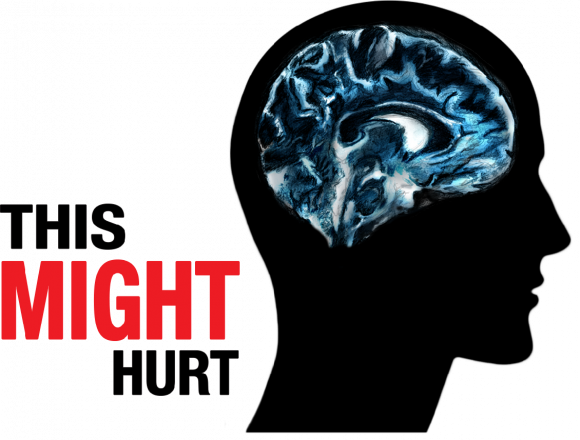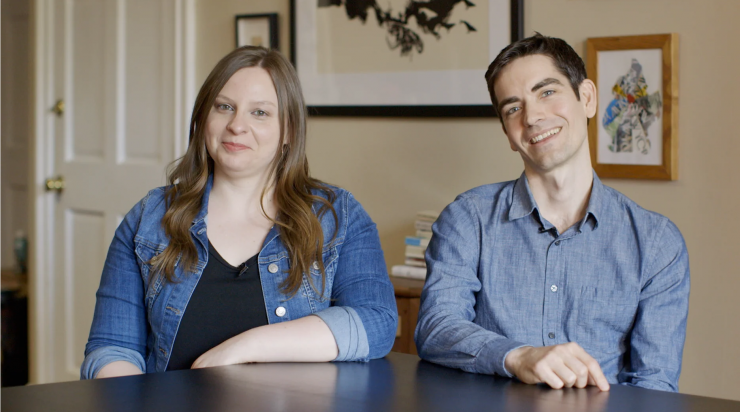This Might Hurt Alumni documentary addresses the hidden realities of chronic pain
July 1, 2019
Many powerful documentaries are born out of personal pain—a traumatic or tragic experience the filmmaker feels compelled to explore and share. For Kent Bassett (MFA/FP ’08) that pain was literal, and the result was a film aimed at helping sufferers of chronic pain explore a new avenue of relief, based on understanding that not all pain has a physical origin.
Bassett was an undergraduate at Swarthmore College interested in political activism and social justice issues when his life was turned upside down by the onset of terrible, unexplained pain in his arms—pain so intense that turning a doorknob was almost unbearable. Unable to type, he was forced to drop out of college and began a round of visits to a dozen doctors, who diagnosed tendonitis and prescribed physical therapy, to no avail.
Then Bassett experienced a miracle.
He found and read a book by the late Dr. John Sarno, The Mindbody Prescription, whose theory is that emotions and anxiety can cause severe physical pain and that this pain can be cured by addressing them. Overnight, his pain went away.
That astonishing experience sparked a deep interest in exploring the mind-body connection. Curious if there was a blind spot in modern medicine about how commonly pain and other symptoms are caused by emotions and the brain, and not by tissue damage, Bassett set out to learn more.
“I had fallen through cracks,” he says, “were there others like me?”

In the midst of a national opiod crisis, the resulting film, This Might Hurt, follows three sufferers of chronic pain over a period of years of their treatment with Dr. Howard Schubiner, chronicling their journeys to find relief and exploring the conflicts and controversies surrounding treating pain with no known physical cause.
Fellow alum Marion Cunningham BFA/FTV/FTP ’05 joined Bassett on this journey when they connected at a First Cut screening of Dodge College films in New York City. She instantly connected with the story when Bassett showed her footage from his work in progress.
“Our film offers a new way of looking at pain, it’s not a cure-all,” she says, “but it could help a large swath of people, many of whom are in pain without hope of relief. We hope our story gives them hope and reminds them that they’re not alone.”
After a multi-year journey, Bassett and Cunningham have launched an Indiegogo campaign to procure finishing funds. They are eager to share what they have learned in the hopes of alleviating some of the suffering that has driven thousands into opiod addiction and, as the government seeks to crack down on opiod use, has seen patients taken off their painkillers driven to suicide.
The filmmakers:
At Chapman, Kent Bassett directed The Line, a short film about the crisis at the U.S.-Mexico border, which won the Brooklyn Film Fest’s Spirit Award. He’s edited several documentaries, including Standing Up, Personal Statement, and a film about activist Ady Barkan (in progress). He began his film career at Magical Elves, a Los Angeles-based reality TV company that produces shows including Top Chef and Project Runway, working his way up from working as a PA driving DVDs around town to becoming an editor. He now lives in New York and edits feature documentaries.
 Marion Cunningham moved to New York immediately after graduation and began her career as a transcriber at Original Media. From there, she worked her way up to AP, then becoming a field and post producer. She’s worked on shows including Storm Chasers for Discovery and Girls Incarcerated for Netflix, and was a producer for President Obama’s 2012 re-election campaign. She is currently the Interim Head of TV and Video at OZY Media.
Marion Cunningham moved to New York immediately after graduation and began her career as a transcriber at Original Media. From there, she worked her way up to AP, then becoming a field and post producer. She’s worked on shows including Storm Chasers for Discovery and Girls Incarcerated for Netflix, and was a producer for President Obama’s 2012 re-election campaign. She is currently the Interim Head of TV and Video at OZY Media.
Chronic Pain FAQs
The subject of the mind-body connection driving chronic pain is fraught with misconceptions. Here are a few conclusions the filmmakers have reached during their years of following this story:
Are you saying that all chronic pain is in the head?
The latest neuroscience suggests that all pain is created in the brain. But what causes the pain in the first place? Some pain is caused by structural or tissue damage in the body. This film explores the hypothesis that other forms of pain have a different cause, that it can be caused by stress, trauma, or even the expectation of pain, and this can occur even when there’s nothing wrong with the body. In essence, pain can be brain-induced.
Isn’t all pain a combination of the mental and the physical? What’s the point of saying that some pain is all-mental?
Mind-body medical physicians like Dr. Schubiner have found that it’s clinically useful to distinguish certain painful symptoms as being brain-induced, and to contrast this from pain that originates from tissue damage.
The reason for this distinction is to de-activate the vicious fear-pain cycle that some chronic pain patients get caught in. When patients with brain-induced pain are obsessively worried about the physical decline of their bodies, they are less likely to recover. With a mind-body diagnosis, they’re able to turn their attention to reducing fear and stress, to resolving trauma, in order to find pain relief. Of course, the argument that all pain is about neural networks firing in one way or the other — so it’s all physical—is a fair point. But on a clinical level, distinguishing two types of pain has been found to be useful.
Are you stigmatizing people with chronic pain?
Chronic pain often comes with a huge stigma attached to it. People feel like they’ve tried everything and nothing helped, so they must be broken. Their doctors can be suspicious of them or they can be accused of seeking drugs for recreation. While making the film we worked to tell the stories of three people with pain from their perspective, and with compassion.
Kent: And as someone who has suffered from mind-body chronic pain, I found it liberating to learn that my pain was not caused by tissue damage, but rather, was brain-induced. That meant that that there a potential way out. It didn’t feel stigmatizing to be told my emotions are powerful, that my brain is powerful, and my symptoms are reversible. It felt exciting and hopeful.
How is your film relevant for the opioid crisis?
The ongoing opioid crisis one of the greatest public health crises in U.S. history. Since 1997, nearly 400,000 Americans have died from opioid-related overdoses. One study showed that 60% of the people who died from opioids had received a chronic pain diagnosis in the prior year.
Two of the three people we filmed with have struggled with opioid dependence. One of them was hospitalized for an opioid overdose and nearly died. People who recover from chronic pain through mind-body treatment are typically able to wean themselves off opiates.
Do you support the effort to make it harder for people with chronic pain to get the opioids they need?
In the wake of the government’s response to the opioid crisis, there has been a major problem with chronic pain patients being abruptly taken off their opioid painkillers. Some have committed suicide out of desperation. Great care needs to be taken when anyone is trying to wean themselves off opioids. We don’t support taking opioids away from people who depend on them to manage their pain.
At the same time, for good reason, the CDC has recommended that physicians not put chronic pain patients on opioids in the first place. There’s good evidence that they don’t work any better than Tylenol, and they have dangerous side effects.

